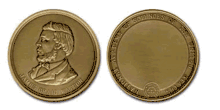James Craig Watson
| James Craig Watson | |
|---|---|
|
Portrait of James Craig Watson | |
| Born |
January 28, 1838 Fingal, Ontario |
| Died |
November 23, 1880 (aged 42) Madison, Wisconsin |
| Cause of death | peritonitis |
| Nationality | Canadian |
| Education | University of Michigan, University of Wisconsin |
| Alma mater | University of Michigan |
| Occupation | Professor, physicist, astronomer |
| Known for | Discovery of comets and asteroids |
| Awards | Lalande Prize |
| 79 Eurynome | September 14, 1863 |
| 93 Minerva | August 24, 1867 |
| 94 Aurora | September 6, 1867 |
| 100 Hekate | July 11, 1868 |
| 101 Helena | August 15, 1868 |
| 103 Hera | September 7, 1868 |
| 104 Klymene | September 13, 1868 |
| 105 Artemis | September 16, 1868 |
| 106 Dione | October 10, 1868 |
| 115 Thyra | August 6, 1871 |
| 119 Althaea | April 3, 1872 |
| 121 Hermione | May 12, 1872 |
| 128 Nemesis | November 25, 1872 |
| 132 Aethra | June 13, 1873 |
| 133 Cyrene | August 16, 1873 |
| 139 Juewa | October 10, 1874 |
| 150 Nuwa | October 18, 1875 |
| 161 Athor | April 19, 1876 |
| 168 Sibylla | September 28, 1876 |
| 174 Phaedra | September 2, 1877 |
| 175 Andromache | October 1, 1877 |
| 179 Klytaemnestra | November 11, 1877 |
James Craig Watson (January 28, 1838 – November 22, 1880) was a Canadian-American astronomer, discoverer of comets and minor planets, director of the Ann Arbor Observatory, and awarded with the Lalande Prize in 1869.[2]
He was born in the village of Fingal, Ontario Canada. His family relocated to Ann Arbor, Michigan in 1850. At age 15 he was matriculated at the University of Michigan, where he studied the classical languages. He graduated with a BA in 1857 and received a master's degree on examination after two years' study in astronomy under professor Franz Brünnow.[3] He became Professor of Physics and instructor in Mathematics, and in 1863, succeeded him as professor of Astronomy and director of the Detroit Observatory. He wrote the textbook Theoretical Astronomy in 1868.
He discovered 22 asteroids, beginning with 79 Eurynome in 1863. One of his asteroid discoveries, 139 Juewa was made in Beijing when Watson was there to observe the 1874 transit of Venus. The name Juewa was chosen by Chinese officials (瑞華, or in modern pinyin, ruìhuá). Another was 121 Hermione in 1872, from Ann Arbor, Michigan, and this asteroid was found to have a small asteroid moon in 2002.[4]
He was a member of the most important expeditions for astronomical observation sent out by the United States Government during his time.[3] The first was an expedition to observe the eclipse of the Sun at Mount Pleasant, Iowa, in 1869; the second of a similar expedition to Sicily, in 1870; the third to Beijing, China, to observe the transit of Venus in 1874; the fourth to Wyoming, to observe the total eclipse of the sun in 1878. He was a strong believer in the existence of the planet Vulcan, a hypothetical planet closer to the Sun than Mercury, which is now known not to exist (however the existence of small Vulcanoid planetoids remains a possibility). He believed he had seen such two such planets during his observation of the 1878 solar eclipse.
In 1879 he resigned his professorship at Ann Arbor to accept a call to the University of Wisconsin, where he hoped to find superior apparatus and instruments for the difficult observations which he had planned. He died of peritonitis at the age of only 42 and was buried at Forest Hill, Ann Arbor.[3] He had amassed a considerable amount of money through non-astronomical business activities. By bequest he established the James Craig Watson Medal, awarded every two years by the National Academy of Sciences for contributions to astronomy.
Watson won the Lalande Prize given by the French Academy of Sciences for 1869.[5] He was a member of the National Academy of Sciences and the American Philosophical Society. He received the honorary degree of Doctor of Philosophy from the University of Leipzig in 1870, and from Yale College in 1871, and the degree of Doctor of Laws from Columbia in 1877.[3]
The main-belt asteroid 729 Watsonia is named in his honour, as is the lunar crater Watson.[2]
References
- ↑ "Minor Planet Discoverers (by number)". Minor Planet Center. 22 June 2016. Retrieved 11 July 2016.
- 1 2 Schmadel, Lutz D. (2007). Dictionary of Minor Planet Names – (729) Watsonia. Springer Berlin Heidelberg. p. 70. ISBN 978-3-540-00238-3. Retrieved 11 July 2016.
- 1 2 3 4 Hinsdale, Burke (1906). History of the University of Michigan. Ann Arbor, MI: University of Michigan. pp. 235–236.
- ↑ Linda T. Elkins-Tanton - Asteroids, Meteorites, and Comets (2010) - Page 96 (Google Books)
- ↑ "The Lalande Medal". Appletons' Annual Cyclopedia and Register of Important Events of the Year 1873. vol. 13. 1874. p. 49.
- Richard Baum and William Sheehan (1997). In Search of Planet Vulcan, The Ghost in Newton's Clockwork Machine. ISBN 0-306-45567-6.
External links
- "Biography". Dictionary of Canadian Biography Online.
.jpg)
